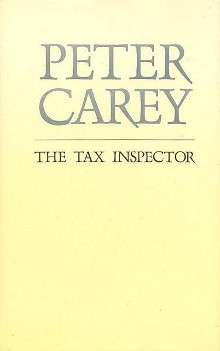The Tax Inspector
The Tax Inspector is a 1991 novel by Australian writer Peter Carey.
 First edition cover | |
| Author | Peter Carey |
|---|---|
| Country | Australia |
| Language | English |
| Publisher | University of Queensland Press |
Publication date | 1991 |
| Media type | Print (Hardback & Paperback) |
| Preceded by | Oscar and Lucinda |
| Followed by | The Unusual Life of Tristan Smith |
Plot summary
The setting for most of the novel "is Catchprice Motors, a terminally run-down used car business founded by Frieda Catchprice in the Forties but now resembling nothing more than a 'badly tended family grave'. The Catchprices live in Franklin, New South Wales, which used to be a country town twenty miles from Sydney: since then Sydney has swollen out of recognition (it's now the second biggest city in the world, after Calcutta), and suddenly Franklin finds itself only two miles along the F4 from the outermost suburbs. Responsibility for running the business rests mainly with Frieda’s daughter Cathy, a rather miserably aspiring Country and Western singer, and her sleazeball husband Howie, who sports a pencil-thin moustache and 'a secret rash which stopped in a clean line at his collar and the cuffs of his shirt'. Cathy's brother Mort is a more sporadic presence, while the other brother, Jack, has taken the wisest course of all and left Franklin for good: even if, as he sometimes admits to himself, all his best endeavours can never rescue him from being 'a Catchprice – damaged, compromised, expedient'."[1]
Reviews
- Powell's Books: "The entire story is covered in thick, tar-like humor, delivered with deadpan wit as dry as the martini you'll need to get you through these four apocalyptic days. The whole thing feels dirty. Not dirty like HBO late-night. But, dirty like a city street in a bad neighborhood. Dirty like a back-alley speakeasy. Dirty like thieving Mafia cheats. And, underneath all the soot and grime lies an incredibly compelling tale. Compelling because it's clear that Carey is so charmed by these misfits he evokes a compassion that keeps the cast of characters from turning into strange comic book representations of themselves."[2]
- The New York Times: "Peter Carey writes beautiful sentences, worked on but not labored; his descriptive passages sweep us along and leave us in some felicitous, unanticipated place.[3]
- Tabula Rasa: "Carey's writing is always dense and intricate, and he's thus not the easiest author to read -- though at its best the sheer beauty of it is more than enough reward."[4]
References